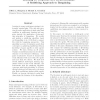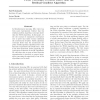101
Voted
ICML
2003
IEEE
16 years 3 months ago
2003
IEEE
111
Voted
ICML
2003
IEEE
16 years 3 months ago
2003
IEEE
The majority of theoretical work in machine learning is done under the assumption of exchangeability: essentially, it is assumed that the examples are generated from the same prob...
ICML
2003
IEEE
16 years 3 months ago
2003
IEEE
We present a fast iterative support vector training algorithm for a large variety of different formulations. It works by incrementally changing a candidate support vector set usin...
113
Voted
ICML
2003
IEEE
16 years 3 months ago
2003
IEEE
Theoretical and experimental analyses of bagging indicate that it is primarily a variance reduction technique. This suggests that bagging should be applied to learning algorithms ...
112
Voted
ICML
2003
IEEE
16 years 3 months ago
2003
IEEE
This paper addresses the problem of classification in situations where the data distribution is not homogeneous: Data instances might come from different locations or times, and t...
106
click to vote
ICML
2003
IEEE
16 years 3 months ago
2003
IEEE
As text corpora become larger, tradeoffs between speed and accuracy become critical: slow but accurate methods may not complete in a practical amount of time. In order to make the...
123
Voted
ICML
2003
IEEE
16 years 3 months ago
2003
IEEE
Feature selection, as a preprocessing step to machine learning, has been effective in reducing dimensionality, removing irrelevant data, increasing learning accuracy, and improvin...
135
click to vote
ICML
2003
IEEE
16 years 3 months ago
2003
IEEE
Learning in many multi-agent settings is inherently repeated play. This calls into question the naive application of single play Nash equilibria in multi-agent learning and sugges...
126
Voted
ICML
2003
IEEE
16 years 3 months ago
2003
IEEE
We study the common problem of approximating a target matrix with a matrix of lower rank. We provide a simple and efficient (EM) algorithm for solving weighted low-rank approximat...
104
click to vote
ICML
2003
IEEE
16 years 3 months ago
2003
IEEE
In Reinforcement Learning (RL) there has been some experimental evidence that the residual gradient algorithm converges slower than the TD(0) algorithm. In this paper, we use the ...



